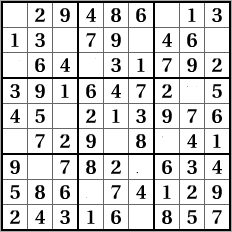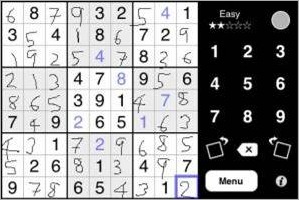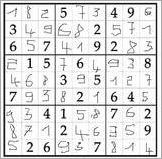 Years ago, when I discovered Sudoku, I treated it as a game. At first, I made copies of the game so my eldest daughter Eden and I could compete with each other. She was always faster than I was, yet we both thought it was just a game and played it for fun.
Years ago, when I discovered Sudoku, I treated it as a game. At first, I made copies of the game so my eldest daughter Eden and I could compete with each other. She was always faster than I was, yet we both thought it was just a game and played it for fun.
Over time, after much trial and error, I realized I could use some techniques to improve my speed, so I bought Sudoku books and kept one in my bag to play when I waited somewhere, during flights or just when the house was quiet and I needed to relax. Some people say it is funny when I say playing Sudoku helps me relax, but it does. I can tell how concentrated I am by the level of mistakes I make.
Although you may think you need mathematical abilities to play Sudoku (I insist on calling it a game), Sudoku requires good visual perception, hand-eye coordination, logic and focus. In fact, every kid who can recognize the numbers from 1 to 9 and the order of the numbers (just recognize, without even knowing their value), can play Sudoku.
Scientists and researchers think the Sudoku puzzle is one of the easiest ways to improve brain function (other brain boosters are a high-protein diet, listening to classical music and rest). The same way physical activity produces healthy bodies, playing Sudoku is an effective way to stimulate the brain. Playing Sudoku keeps brain cells from dying and keeps the brain active and vital.
Some schools have introduced playing Sudoku as part of their daily routine after discovering that kids who played the game had higher IQs.
 Ian Robertson, a neuroscientist, checked the mental effect of playing Sudoku on elders. His used two groups – one played Sudoku as part of their daily life and the other did not. He compared their IQ level before and after and discovered that the IQ of Sudoku players increased significantly.
Ian Robertson, a neuroscientist, checked the mental effect of playing Sudoku on elders. His used two groups – one played Sudoku as part of their daily life and the other did not. He compared their IQ level before and after and discovered that the IQ of Sudoku players increased significantly.
In another research, 3,000 elders aged 65 to 94 improved their mental abilities by as much as 14 years’ worth just by having ten sessions of playing brain boosting games, one of which was Sudoku. Many elders are encouraged to play the Sudoku to prevent memory loss and dementia.
The most wonderful thing about the game is that buying a Sudoku book is cheap and a short search on the internet will reveal plenty of free tables to print or even play online.
Although the benefits of playing the game are obvious in adult life, kids can greatly benefit from playing the game too. While playing Sudoku, the brain stimulates growth of new cells and creates new pathways and connections.
As part of my Kids Coaching program, I get kids as young as 5 years old (as I said, they only need to know the numbers from 1 to 9 and their order) play Sudoku. You can do it with your kids too.
How to help young kids play Sudoku
- Explain to your kids the effect of playing the game on brain function
- Play Sudoku yourself and be an inspiration
 For young kids, use a Sudoku puzzle with a reference to remind them which number they are looking for. If they find all the 3’s for example, teach them to erase and not look at it any more. See an example in the image on the right
For young kids, use a Sudoku puzzle with a reference to remind them which number they are looking for. If they find all the 3’s for example, teach them to erase and not look at it any more. See an example in the image on the right- Print a solved Sudoku puzzle (from the internet or from the end of your Sudoku book) and use whiteout to blank out some of the numbers. If you do it systematically, your kids will always think it is a fun game and their confidence and ability will increase with their success.
At first, only erase 1 number from each square- this will help them check each table separately. If needed highlight the borders of each square (out of the 9) to help them focus.
Then, erase only one number from each horizontal row to teach your kids to check rows. Then, erase one number from each column.
The next levels are erasing a number from each row or column and then another number from each square. - Match the size of the puzzle and the font to your kids’ age. The younger the kids are, the bigger the size
- Remember: there is no guessing in Sudoku, so your kids should only write numbers they are sure of
 When they get to a good level, ask your kids to time themselves, but be sensitive to the way they respond to this, because some kids find it stressful. Working quickly is a different skill to finding the missing numbers and their speed will improve naturally over time, so avoid pressure if it means no more fun.
When they get to a good level, ask your kids to time themselves, but be sensitive to the way they respond to this, because some kids find it stressful. Working quickly is a different skill to finding the missing numbers and their speed will improve naturally over time, so avoid pressure if it means no more fun.
It is estimated that after 10 sessions only, your kids’ brain function will improve, not to mention burning 90 calories an hour while playing. I say it is easy, what about you?
Happy parenting,
Ronit
 For young kids, use a Sudoku puzzle with a reference to remind them which number they are looking for. If they find all the 3’s for example, teach them to erase and not look at it any more. See an example in the image on the right
For young kids, use a Sudoku puzzle with a reference to remind them which number they are looking for. If they find all the 3’s for example, teach them to erase and not look at it any more. See an example in the image on the right When they get to a good level, ask your kids to time themselves, but be sensitive to the way they respond to this, because some kids find it stressful. Working quickly is a different skill to finding the missing numbers and their speed will improve naturally over time, so avoid pressure if it means no more fun.
When they get to a good level, ask your kids to time themselves, but be sensitive to the way they respond to this, because some kids find it stressful. Working quickly is a different skill to finding the missing numbers and their speed will improve naturally over time, so avoid pressure if it means no more fun.










